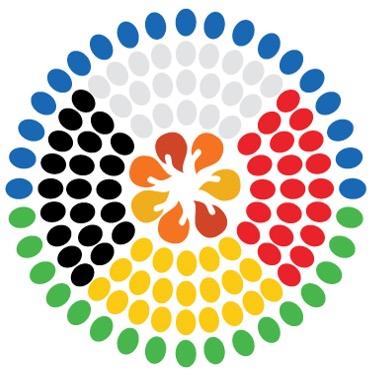We are Nicky Bowman, Charmagne Campbell-Patton, and Michael Quinn Patton, here to share about a partnership between the Robert Wood Johnson Foundation and Bowman Performance Consulting, a native and women-owned evaluation firm. This is a story about decolonizing funding, partnerships, and design/implementation of a project and related processes. Our intergenerational and intersectional team brought together diverse perspectives from within evaluation, as well as amplified voices and perspectives across many cultures and backgrounds.
We designed and implemented the partnership around the Stockbridge-Munsee/Lunaape Medicine wheel, which was then expanded to a Seven Directions Healthy Journey Framework through consultation with grantees and advisors.


Starting in the Eastern Door of Being a Good Relative and Keeping Good Relations, our partnership was rooted in relationships, cultural values of the partners and shared experiences. We also braided our work together through our three companies and led, co-led, and/or supported each other throughout the entire design, implementation, and creation of work products.
Moving to the Southern Door of Keeping a Good Mind and Contributing to Good Thinking, we designed the work, the processes, structure and funding over the course of two contract phases, resulting in the development of a Seven Directions Healthy Journey Framework, pictured below. Read more about this framework here.

Through the Western Door of Orienting our Actions to Good Work, we applied and refined the Seven Directions Healthy Journey Framework through engagement with Indigenous and non-Indigenous grantees, as well as a scan of published and Grey literature. Our questions were developed based on traditional teachings in combination with the foundational question of how health equity is being addressed in the face of a changing climate.
Through the Northern Door of Creating Wisdom that Sustains and Nurtures the Next Seven Generations, we identified lessons learned to support the work going forward for funders and evaluators/evaluation firms in decolonizing funding and partnerships. Emerging conclusions helped to inform the development of a seven directions healthy journey framework that will inform the grantmaking and communications strategy of a major US philanthropic foundation.
Lessons Learned
Throughout the two phases of the project, we dug into what decolonization looked and felt like in practice through funding, structure, engagement, and creation/testing/refining of an evaluation framework. As we face a world that is increasingly polarized and challenges that transcend boundaries and borders of all forms, decolonizing our work and amplifying underrepresented voices through a framework that highlights the interconnectedness of human and climate health is more important than ever.
Decolonizing funding and the way we typically design programs has led to reconceptualizing how Foundations invest in small evaluation and minority owned businesses, elevate and utilize grantee voices to shape Foundation initiatives, and more strongly supports partnerships that result in reciprocal learning at the nexus of human and climate health to transform and innovate our evaluation practices.
Rad Resources
We invite you to watch this video to learn more about this project and the Seven Directions Healthy Journey Framework.
We also hope you will join us at the American Evaluation Association Conference in Portland next week as we go deeper into this partnership and what we have learned. Our presentation will take place on Thursday, October 24th at 2:30pm.
The American Evaluation Association is hosting Indigenous Peoples in Evaluation (IPE) TIG week. All posts this week are contributed by members of the IPE Topical Interest Group. Do you have questions, concerns, kudos, or content to extend this AEA365 contribution? Please add them in the comments section for this post on the AEA365 webpage so that we may enrich our community of practice. Would you like to submit an AEA365 Tip? Please send a note of interest to AEA365@eval.org. AEA365 is sponsored by the American Evaluation Association and provides a Tip-a-Day by and for evaluators. The views and opinions expressed on the AEA365 blog are solely those of the original authors and other contributors. These views and opinions do not necessarily represent those of the American Evaluation Association, and/or any/all contributors to this site.
